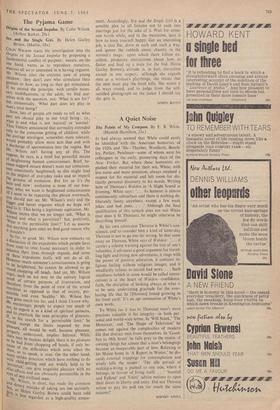A Quiet Noise
The Points of My Compass. By E. B. White. (Hamish Hamilton, 21S.) IT had always seemed that White could easily be identified with the American humorists of the 1920s and '30s—Thurber, Woollcott, Bench- ley, Parker, Perelman—some of whom were his colleagues in the early, pioneering days of the New Yorker. But where these humorists ex- ploited their material for their wit, White, with less noise and more precision, always retained a respect for his material and left room for dis- tinctly personal discovery in his words. Writing here of Thoreau's Walden in 'A Slight Sound at Evening,' White says : `. . . its humour is almost continuously subsurface and there is nothing de- liberately funny anywhere, except a few weak jokes and bad puns. . . .' Although the final qualification of this remark does not suit White (nor does it fit Thoreau), he might otherwise be describing himself.
By his own admission Thoreau is White's con- science, and to consider him a kind of latter-day Thoreau is not to go too far wrong. In that same essay on Thoreau, White says of Walden: `... it carries a solemn warning against the loss of one's valuables, it advances a good argument for travel- ling light and trying new adventures, it rings with the power of positive adoration, it contains re- ligious feeling without religious images, and it steadfastly refuses to record bad news. . . . Such steadiness (which in some would be called intoxi- cation) is at the heart of Walden—confidence, faith, the discipline of looking always at what is to be seen, undeviating gratitude for the ever- lasting life that he [Thoreau] found growing in his front yard.' It's an apt summation of White's own work.
To White (as it was to Thoreau) man's most precious valuable is his integrity—in both per- sonal and world-wide terms. In 'Will Stunk,' The Motorcar,' and 'The Shape of Television' he comes out against the complexities of modern life that distract men from themselves. In 'Good- bye to 48th Street' he falls prey to the mania of owning things but admits that a man's belongings become an inseparable part of him. Relaxing in his Maine home in 'A Report in Winter,' he dis- cards external trappings for contemplation and wisely tells the reader: The idle pursuit of making-a-living is pushed to one side, where it belongs, in favour of living itself. . . ."Sootfall and Fallout' and `Unity' advise nations to open their doors to liberty and unity. Did not Thoreau refuse to pay his poll tax for much the same reasons?
STEVEN KROLL










































 Previous page
Previous page